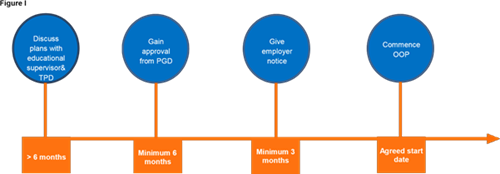You can take time out of programme in one of the following categories:
Out of Programme for Clinical Training (OOPT) – this involves clinical training out with your deanery and the time does count towards your CCT/CESR.
Out of Programme Experience (OOPE) – this is usually to benefit you as a trainee (for example the Scottish Clinical Leadership Fellowship) or help support the needs of another country. Generally OOPE does not have formal training supervision and therefore does not count towards CCT/CESR
Out of Programme Research (OOPR) – This is time taken out of training to gain valuable research experience leading to a postgraduate degree (MD/PhD) or working as a clinical research fellow.
Out of Programme for a career break (OOPC) – this involves stepping out of your training programme for a designated, agreed period of time.
This section will focus on the process of applying for OOPR in Scotland
In Scotland time OOPR will be considered for a research project leading to an MSc Research, MD or PhD with priority given to external peer-reviewed funding from a major charity (Wellcome, CRUK, MRC etc.)
Time OOPR does not usually exceed 3 years and trainees in their final year will not normally be granted OOP.
The process for applying for OOPR is summarised in the figure below and requires written agreement of the lead dean/director of the programme – for O&G in Scotland this person is Alan Denison (Alan.denison@nes.scot.nhs.uk). The form to apply for OOPR in Scotland can be found here Application form for OOP/Acting Up
(https://www.scotlanddeanery.nhs.scot/trainee-information/out-of-programme-oop/)

Once deanery approval for the OOPR has been granted, a copy of the form should be forwarded to the RCOG for placement in your file (this should be sent to the policy coordinator for quality, tchambers@rcog.org.uk).
GMC approval
If your period of OOPR is includes significant daytime duties in O&G, you may wish to consider this time counting towards your CCT. This needs to be approved prospectively and supported by the local school of O&G and the postgraduate dean. Out of hours duties in O&G do not count towards CCT.
To apply for GMC approval the above form needs to be filled in and approval sought from the deanery. Once deanery approval has been granted the documentation needs to be sent to the RCOG with a detailed timetable outlining all research and clinical components. The RCOG will then recommend how much time should count towards the CCT/CESR via the chair of the Specialty Education Advisory Committee (SEAC) and respond directly to the deanery. The deanery will then submit the application to the GMC, alongside the approval letter from the RCOG. If approved, the GMC will send a confirmatory email to all parties.
Prioritisation of OOPR
As stated above OOPR will be prioritised according to what is being asked for. For example a three-year PhD with peer-reviewed external funding from a major charity would be given high priority compared to ‘soft-money’ or speculative projects which may not be given the same priority.
OOP is not normally granted for taught courses such as MSc degrees. Medical education degrees will only be granted in the context of leading to a higher degree such as an MD.
ARCP requirements for OOPR trainees
Whilst OOPR you will receive an outcome 8 in ARCP but there are a number of other documents that you need to fill in as part of the ARCP process
*if there is GMC approval for some of the time OOPR to count for training then formal assessment and documentation must be uploaded annually for the ARCP.
This page was last updated on: 03.11.2021 at 13.59